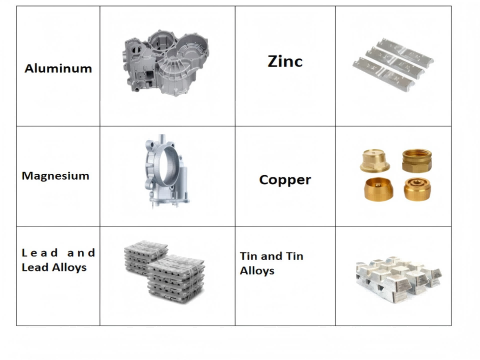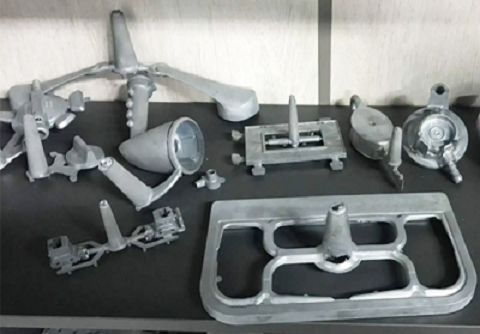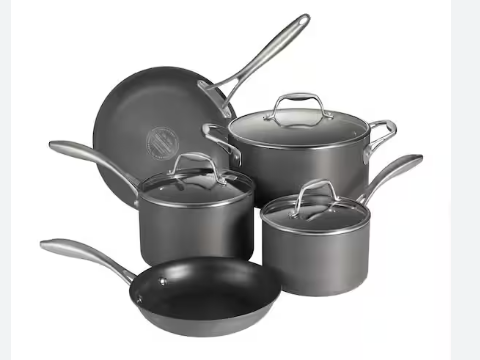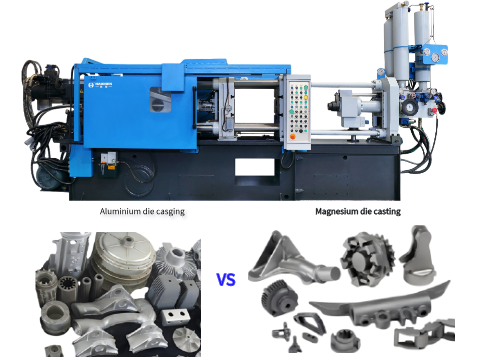The raw materials for die casting are mainly various non-ferrous metals and their alloys,like Zinc,Aluminium and Copper.
Which have a low melting point and are suitable for injection into moulds under high pressure for forming.

Details of various metal die-casting raw materials
Commonly used die-casting materials are:
- Zinc alloy
- Aluminium alloy
- Magnesium alloy
- Copper alloy
- Tin alloy
Zinc alloy
zinc alloy is one of the most common die-casting materials, because it is easy to form and low melting point (about 380.5 ° C), suitable for the manufacture of small die-casting parts.
Aluminium alloy
Aluminium alloy is another common die-casting material, especially suitable for large-scale die-casting, because of its lower cost and better mechanical properties.
Magnesium alloy
Magnesium alloy is commonly using in the manufacture of automotive parts because of its light weight and high strength characteristics.
Copper alloy
Copper alloy is also used for die casting, although its use is not as common as zinc, aluminium and magnesium alloy.
Lead alloys
lead alloys are sometimes used in die casting because of their low melting point and good fluidity.
Tin alloys
Tin alloys are also suitable for die casting, especially in applications requiring high strength and corrosion resistance.
Various types of die casting materials have different physical characteristics and working in different industrial processes.
The die casting mould itself is usually made of tool steel with a high melting point (e.g. H13 steel) to withstand the high temperatures and pressures generated during the die casting process.
What can be produced from zinc alloy die casting raw materials?
Zinc alloy die casting raw material plasticity strong application field wide can produce a variety of people’s livelihood industrial field products products such as:

- Hardware fittings
- Auto parts
- Industrial fittings
- Decorative products
- Household goods and office equipment
- Toys and commercial machines
- Architectural hardware and locks
Hardware accessories
Zinc alloy die casting raw materials are commonly used in the production of a variety of hardware accessories, such as luggage buckle, belt head, buttons, shoe buckles and so on.
Automotive parts
zinc alloy die casting is widely used in the automobile manufacturing industry for the production of a variety of automotive parts.
3. Industrial parts:
zinc alloy die castings are also used to manufacture industrial parts, such as wheel hub stops, computer terminal brackets, bolt guides and so on.
Decorative products
zinc alloy is also commonly used in the production of decorative products due to its good plating and surface treatment properties.
Household goods and office equipmen
zinc alloy die castings are also used in the manufacture of household goods and office equipment.
Toys and commercial machines
In addition, zinc alloy die castings are also used in the manufacture of toys and commercial machines.
Architectural hardware and locks
Zinc alloy die casting is using in the production of architectural hardware and locks.
Because zinc alloy die casting raw material has low melting point, good fluidity, easy to pressure moulding and other characteristics, make it in the manufacture of complex shape, smooth surface precision die casting has significant advantages, the scope of application is very wide.
Aluminium alloy die casting raw material applications

Aluminium alloy die casting raw materials have a wide range of applications in many fields, especially in the automotive industry and aerospace industry.
The following are the main application areas and characteristics of aluminium alloy die casting raw materials:
- 1.Automobile industry
- 2.Aerospace
- 3.New energy vehicles
- 4.Other industries
- 5.Material characteristics
- 6.Integrated die-casting technology
1.Automobile industry
* Power system: aluminium alloy die casting is widely using in the engine block, cylinder head cover, crankcase, oil sump, piston and other key parts manufacturing.
*Transmission system: including transmission housing, clutch housing, gearshift forks, etc..
*Chassis assembly: suspension bracket and cross member and other parts also use aluminium alloy die-casting process.
* body structure parts: aluminium alloy die casting is also for wheel hubs, body structure parts and decorative products.
2.Aerospace:
Aluminium alloy die casting also has important applications in aerospace field, such as jet engine compressor shell and accessory shell.
3. New energy vehicles:
In the production of new energy vehicles, aluminium alloy die castings are used in battery systems (such as battery pack shells, water cooling plates), electric drive systems (such as motor shells, reducer shells) and electronic control systems (such as inverter box, control box) and so on many aspects.
4. Other industries:
Aluminium alloy die castings are also working in home appliances, machinery, hardware, medical equipment, communication equipment and other fields.
5.Material properties:
Aluminium alloy die casting has the advantages of low density, high wear resistance, high mechanical strength, good heat transfer and electrical conductivity, high temperature resistance, and so on, so it is very popular in the field of light weight and high strength is needed.
Common die-casting aluminium alloy according to the composition is divided into Al-Si, Al-Cu, Al-Mg and Al-Zn four series, of which the Al-Si system is the most widely used, because of its crystallization temperature interval is small, good fluidity and other characteristics.
6. Integrated die-casting technology:
With the development of automobile lightweight trend, integrated die casting technology has gradually become mainstream.
Especially in the field of new energy vehicles, through the large-scale die casting machine and optimise the process parameters, can produce complex body structure parts, so as to improve the production efficiency and reduce costs.
Aluminium alloy die casting raw materials because of its excellent physical and mechanical properties, in the automotive, aerospace.
New energy and many other fields have been widely using, and with the progress of technology, the scope of its application is still expanding.
Technical difficulties of magnesium alloy die-casting raw materials
Magnesium alloy because of its light weight and high strength characteristics, commonly used in the manufacture of automotive parts, but because of its high temperature melt state instability caused by the actual industrial production of the following technical difficulties:

- Flammable and easy to corrode
- High process barriers
- Charging and solidification speed
- Defect control
- Material properties
- Insufficient high temperature stability
- Difficulty in forming complex structural parts
- The application of vacuum die-casting technology
Flammable and easy to corrode
Magnesium alloy has the characteristics of easy to burn, easy to deform and easy to corrode.
This makes its production process in the process of safety production and die-casting process design put forward higher requirements.
High process barriers
Magnesium alloy die casting process is complex, the technical level needs to be much higher.
For example, although semi-solid injection moulding process is more advanced, but low yield rate, expensive equipment and other problems still exist.
Charging and solidification speed
Due to magnesium alloy charging speed is higher than aluminium alloy, at the same time solidification speed is faster.
This brings great challenges to the runner system and heat balance design of the mould.
Defect control
Magnesium alloy in the die casting process is easy to produce porosity, inclusions and other casting defects.
These defects will affect the quality and mechanical properties of castings.
Material properties
Magnesium alloy has poor plasticity, poor corrosion resistance, and there is a contradiction between strength and plasticity, it is necessary to optimise its properties through solid solution strengthening, long-range ordered phase regulation and other methods.
Insufficient high temperature stability
Magnesium alloy has poor stability at high temperature, which limits its application in high temperature occasions.
Difficulty in forming complex structural parts
Magnesium alloy complex structural parts are difficult to form at one time, poor dimensional accuracy, easy to casting defects.
The application of vacuum die-casting technology
Vacuum die-casting technology can reduce the porosity defects, improve the metallurgical density of die casting, but its application is also facing technical difficulties.
The application of vacuum die-casting technology: vacuum die-casting technology can reduce the porosity defects, improve the metallurgical density of die casting, but its application is also facing technical difficulties.
Haichen die-casting machine is suitable for all kinds of die-casting raw materials
Haichen Precision Research has developed various types of die casting machines over the years for a wide range of die casting raw materials, including aluminium alloys, zinc alloys, magnesium alloys, copper alloys and so on.
These materials have good fluidity and casting performance, and are suitable for production through the die casting process. In addition, the die casting machine can also handle some special alloy materials, such as lead alloy and tin alloy.
Haichen cold chamber die casting machine is suitable for high melting point metals such as aluminium alloys, magnesium alloys and copper alloys.
While hot chamber die casting machine is mainly for low melting point metals such as zinc alloys and lead alloys.
Therefore, different types of die casting machines differ in terms of applicable materials, but in general, die casting machines are able to adapt to the die casting needs of a wide range of metal materials.
Haichen die casting machines are indeed suitable for a wide range of die casting raw materials and can be tailored to individual solutions for your different production needs.



